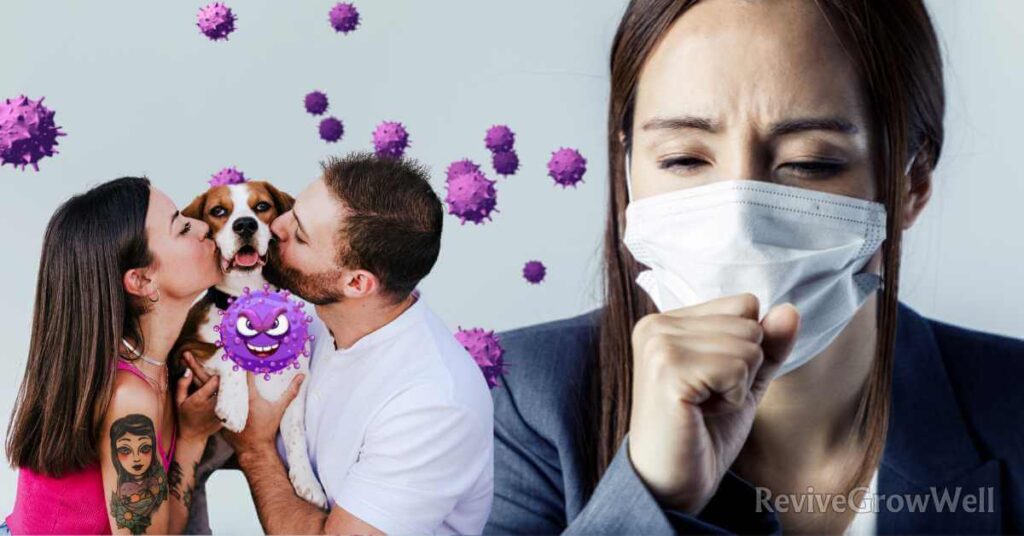Understanding how sinus infections spread is crucial to determining their contagious nature. Sinus infections, or sinusitis, can be either contagious or non-contagious, depending on their underlying causes. The infection itself may not always be directly transmissible, but the pathogens that trigger sinus infections often are. So, are sinus infections contagious through kissing? Let’s delve into this topic to provide clarity.
Modes of Transmission for Sinus Infections
Causes of Sinus Infections
Sinus infections are commonly caused by viruses, bacteria, or fungi:
- Viral Sinus Infections: These are the most prevalent and are often preceded by a cold. Viruses spread through respiratory droplets when an infected person coughs or sneezes. Contact with these droplets, either directly or via contaminated surfaces, can lead to the transmission of the viruses responsible for the infection.
- Bacterial sinus infections: are generally less contagious. They often result from complications of viral infections or individual health conditions that favor bacterial growth within the sinuses. Although bacteria can be present in the environment, they do not typically spread from person to person as easily as viral agents.
- Fungal Sinus Infections: These are rare and usually occur in individuals with weakened immune systems. Fungal infections are generally not considered contagious.
It is important to note that while the sinus infection itself may not always spread, the initial viral infection that leads to sinusitis is often highly contagious. Common respiratory viruses such as rhinovirus, influenza, or respiratory syncytial virus (RSV) are easily transmitted through close personal contact. Activities such as kissing, sharing utensils, or being in close proximity to an infected individual can facilitate the spread of these viruses.
Preventative Measures
Preventative measures are essential in reducing the risk of transmission. Good hygiene practices, including frequent handwashing and using tissues or elbows to cover coughs and sneezes, are key.
Understanding the modes of transmission for sinus infections and their underlying causes can help individuals take appropriate steps to protect themselves and others from potential contagion.
Are Sinus Infections Contagious Through Kissing?

Kissing, a common form of close contact, naturally raises concerns about the transmission of various infections, including sinus infections. The core question is: are sinus infections contagious through kissing?
Sinus infections, or sinusitis, are often caused by viruses, such as the common cold virus, or bacteria. These pathogens can be present in saliva and respiratory droplets, making kissing a potential vector for their transmission.
Pathogen Transmission Through Kissing
When two individuals kiss, the exchange of saliva and close contact can facilitate the spread of viruses. Studies have demonstrated that viral pathogens, such as rhinoviruses and influenza viruses, are readily transmissible through saliva.
Given that these viruses are common culprits behind upper respiratory infections, which can lead to sinusitis, kissing can indeed play a role in spreading the viruses that might eventually cause a sinus infection.
Indirect Transmission
It is important to clarify that while the virus itself can be transmitted through kissing, the sinus infection is not directly contagious. In other words, one person cannot “catch” a sinus infection from another person by kissing.
Instead, they can catch the virus that might lead to sinusitis. This distinction is crucial in understanding the role of kissing in the context of sinus infections.
Preventive Measures for Kissing
Maintaining good hygiene and being cautious about close contact during peak viral seasons can mitigate the risk of viral transmission. For instance, avoiding kissing when exhibiting symptoms of a cold or flu can significantly reduce the likelihood of spreading the virus. Preventive measures can play a vital role in curbing the spread of viruses that lead to sinus infections.
Preventive Measures and Best Practices
Minimizing the risk of spreading sinus infections through kissing and close contact involves a series of practical measures focused on hygiene and health management:
Hygiene Practices
- Handwashing: Regular hand washing with soap and water significantly reduces the likelihood of transmitting infections.
- Avoiding Close Contact: Avoid close contact, including kissing, when experiencing symptoms of a sinus infection, such as congestion, nasal discharge, or facial pain.
Managing Sinus Infections
- Hydration: Staying well-hydrated helps thin mucus, making it easier to expel and reducing the risk of infection.
- Saline Nasal Sprays: Utilizing saline nasal sprays can aid in keeping nasal passages clear and moist.
- OTC Medications: Over-the-counter medications, such as decongestants and pain relievers, can alleviate symptoms and improve comfort.
Seeking Medical Advice
For those experiencing persistent or severe symptoms, seeking medical advice is essential. A healthcare professional can provide a precise diagnosis and recommend appropriate treatments, which may include prescription medications or other interventions. In some cases, antibiotics may be necessary if a bacterial infection is identified.
Lifestyle Habits
- Balanced Diet: Ensuring a balanced diet can bolster the immune system.
- Adequate Sleep: Getting enough sleep helps the body recover and fend off infections.
- Avoiding Smoking: Smoking can irritate the nasal passages and increase susceptibility to infections.
- Using a Humidifier: Using a humidifier at home can maintain optimal humidity levels, preventing the nasal passages from becoming too dry and irritated.
By adhering to these best practices, individuals can significantly reduce the risk of spreading sinus infections through kissing and other close contacts. Implementing these strategies not only protects one’s own health but also safeguards the well-being of others.
Final Thoughts
Understanding the contagious nature of sinus infections and the role of kissing in their transmission is essential for both personal health and public awareness.
While sinus infections themselves are not directly contagious, the viruses that often lead to sinusitis can be spread through close contact, including kissing. Practicing good hygiene, maintaining a healthy lifestyle, and being mindful of symptoms can significantly reduce the risk of spreading these infections.
By taking these preventive measures, individuals can protect themselves and others, ensuring better overall respiratory health.
Sources
Mayo Clinic – Sinus Infection (Sinusitis)
CDC – Common Cold
WebMD – Sinusitis Overview
Healthline – Sinus Infection (Sinusitis)
Johns Hopkins Medicine – Sinusitis
FAQ: Are sinus infections contagious through kissing?
Sinus infections are generally not directly contagious through kissing. However, the viruses that cause sinus infections, such as those responsible for the common cold, can be transmitted through kissing. This means that while you cannot “catch” a sinus infection from kissing, you can catch the virus that might lead to one.
Sinus infections, or sinusitis, are commonly caused by viruses, bacteria, or fungi. Viral infections are the most prevalent and often follow a cold. Bacterial infections can develop as secondary infections, while fungal infections are rare and typically occur in individuals with weakened immune systems.
To prevent the transmission of sinus infections:
- Practice good hygiene, including regular handwashing.
- Avoid close contact with individuals who have symptoms of a sinus infection.
- Cover your mouth and nose with a tissue or your elbow when coughing or sneezing.
- Use saline nasal sprays to keep nasal passages clear and moist.
- Maintain a healthy lifestyle, including a balanced diet, adequate sleep, and avoiding smoking.
Kissing someone with a sinus infection can expose you to the viruses that may have caused their sinusitis. While you may not catch the sinus infection directly, you could catch the virus, which might lead to a cold or respiratory infection that could develop into sinusitis.
Symptoms of a sinus infection include:
- Nasal congestion and thick nasal discharge (yellow or green)
- Facial pain or pressure
- Reduced sense of smell
- Postnasal drip
- Headache, particularly around the forehead or behind the eyes
- Cough, fever, and a feeling of fullness or pressure in the ears
If symptoms persist for more than 10 days or worsen after an initial period of improvement, consult a healthcare provider for proper diagnosis and treatment.





















